Contributory members are able to log private notes and comments about each site
Sites Anne T has logged. View this log as a table or view the most recent logs from everyone
Ancrum Old Church
Trip No.47 Entry No.3 Date Added: 3rd Oct 2017
Site Type: Sculptured Stone
Country: Scotland (Scottish Borders)
Visited: Yes on 20th Sep 2017. My rating: Condition 3 Ambience 5 Access 4
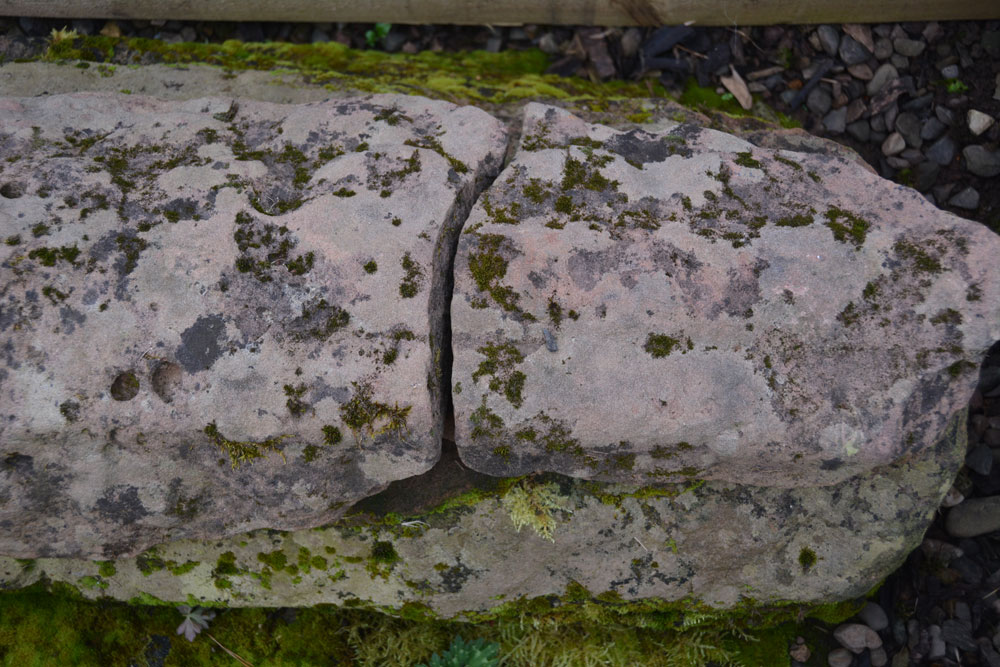
Ancrum Old Church submitted by Anne T on 3rd Oct 2017. A close up of the end of the hogback, trying to see if the camera would pick up any of the relief carving still left on the stone - sadly, no.
(View photo, vote or add a comment)
Log Text: Ancrum Old Church, Scottish Borders: This is a very beautiful location, just to the west of Ale Water and north of the B6400, west of the village of Ancrum. There is parking for 3-4 cars at the south western end of the church yard. A gate and steps lead down into the church yard; the ruined church stands at the northern end of the graveyard.
We walked all around the church, at first unsure of where to look. In the end, by holding my mobile above my head, I managed to get the Canmore record up, so we knew exactly where to look.
Ancrum 1 and 2 are within the village, within private grounds. We did spot the two inscribed slabs, a hogback and a cross base. There was a young man flying a drone all around the church and churchyard, and his dog kept following us. I tried to engage him in conversation, but only got that he was making a film for ‘his own purposes’.
We wandered over the old pack horse bridge to the eastern side of Ale Water, but this was a building site. We could see the western end of Castle Hill hillfort. By this time, it was getting late and the climb looked steep, so we bottled out of the climb, stopping off to look at Ancrum Market Cross on the way to Armadale.
Anchorite Well (Kendal)
Trip No.178 Entry No.2 Date Added: 22nd Jun 2022
Site Type: Holy Well or Sacred Spring
Country: England (Cumbria)
Visited: Yes on 21st Jun 2022. My rating: Condition 4 Ambience 3 Access 4
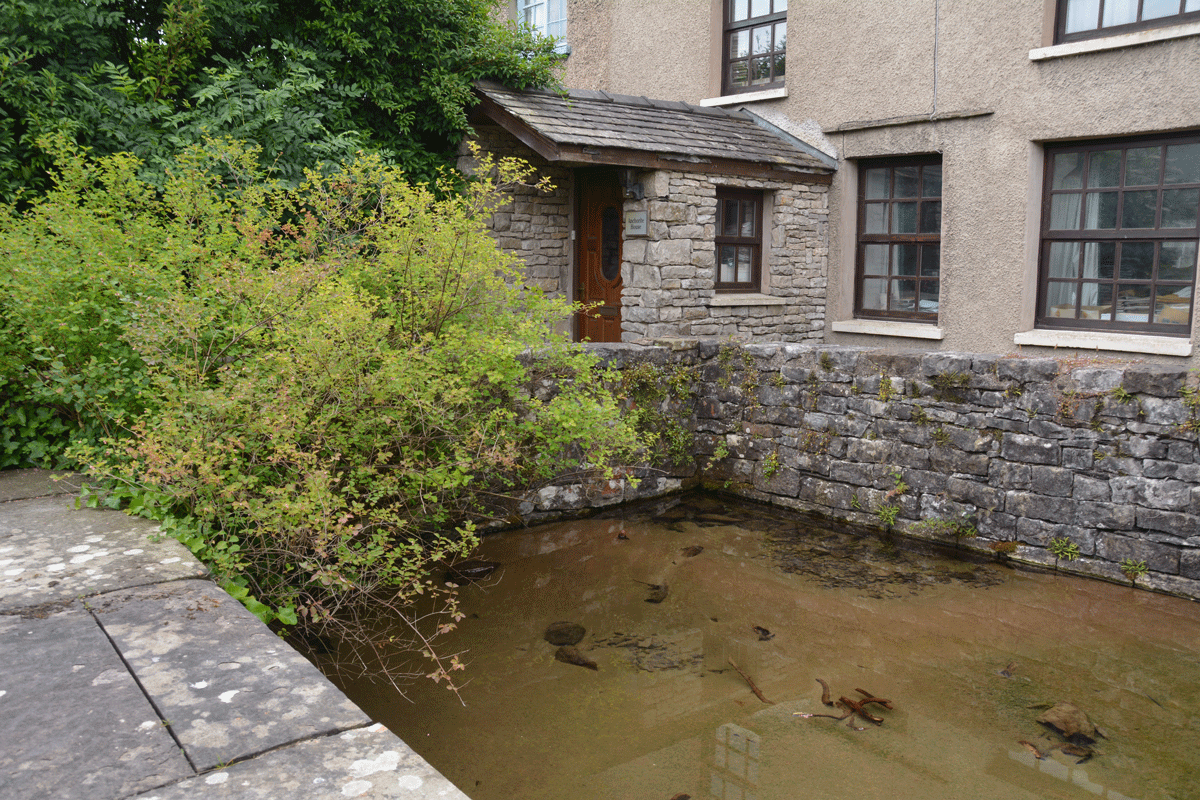
Anchorite Well (Kendal) submitted by Anne T on 22nd Jun 2022. Looking southwards towards Anchorite Cottage. Whilst the cottage looks relatively modern, the style of the windows indicate this structure is older than it looks (but not as old as the original hermitage!).
(View photo, vote or add a comment)
Log Text: Anchorite Well, Kendal: a short-ish walk from Trinity Church (Kendal Parish Church), through a modern housing estate. The roads have some interesting names: Buttery Well Road (couldn't find the well, though), Mint Cake Cottages and Kirkbarrow.
The well was easily spotted as there is a large green metal sign at the entrance to the site.
Beautifully clear water. Would have liked to have been able to walk all the way around the well pool, but the western side path was private access only to the cottages.
An Car, Leckuary
Trip No.88 Entry No.17 Date Added: 2nd Aug 2018
Site Type: Standing Stone (Menhir)
Country: Scotland (Argyll)
Visited: Yes on 18th Jul 2018. My rating: Condition 3 Ambience 5 Access 4
An Car, Leckuary submitted by caradoc68 on 30th Apr 2012. http://canmore.rcahms.gov.uk/en/site/39447/details/an+car+leckuary/
An Car, Leckuary. Is a great standing stone even though it is leaning whether that was the propose of the builders!
(View photo, vote or add a comment)
Log Text: An Car Standing Stone, Leckuary: We found this stone on the OS map, and it is also featured on page 130 (walk 17) of the “In The Footsteps of Kings” book. We are advised by the book: “Please call at the farm if you wish to get closer to this stone”.
We thought about letting ourselves in through the gates at the bottom of the farm track, next to the road, but there were four gates all tied together with twine. Putting my hand on one of them had the whole lot rocking; no way they’d bear my weight clambering over. We decided to walk up towards the farm to see if there was another way into the field, and ended up at the bottom of the hill where the track climbed up a slope towards the farmhouse. Being almost at the farm, I walked up the track, and heard voices coming from the garden right at the back of the farm. There the farmer, his wife and three friends were enjoying the afternoon sunshine.
After apologising for interrupting their afternoon, they were only too pleased to let us see the stone. I got into discussion with the farmer, who did a lot of archaeology with Historic Scotland and Kilmartin Museum. He, in his impressive yellow aviator shades, very kindly gave us directions to a rock art panel, found by him three years ago and currently unrecorded, but about to be included in a survey of rock art sites in the Glen, starting August 2018. The farmer did warn me to be careful when opening and closing the gates: “make sure they don’t fall over!” so he’s obviously aware of the problem with the gates at the bottom of the track.
We let ourselves in the field from the gate at the bottom of the hill up to the farmhouse (the farmhouse, looking back from the stone, appears to be on top of a large, flattened mound, which seemed a little like a motte).
The sun was low in the sky by now and trying to find the right angle to photograph this stone was interesting. The farmer had heaped a pile of stones around the base of this now leaning standing stone, whether field clearance or to keep it upright, or both; this gave the appearance of being a modern day cairn or grave. I wondered who was buried underneath. Canmore says no one, but I’d prefer to be more romantic about it!
Altar Stone, Stobo
Trip No.5 Entry No.4 Date Added: 14th Aug 2016
Site Type: Standing Stone (Menhir)
Country: Scotland (Scottish Borders)
Visited: Yes on 10th Aug 2016. My rating: Condition 2 Ambience 3 Access 5
Altar Stone, Stobo submitted by austenjohnreid on 5th May 2010. Site in Scottish Borders Scotland
(View photo, vote or add a comment)
Log Text: Altar Stone, near Stobo, Scottish Borders: This stone is clearly marked on the map and features on the Portal, but I can find out nothing about it on Canmore or other web sites.
From Tinnis Castle, driving up the B712 through Drumelzier and Drumelzier Haugh, just past Dawyck Botanic Garden, a small road turns sharp left up through a hamlet called ‘Altarstone’. Opposite the farmhouse, hidden beneath tree branches at the edge of the road is the altar stone Intriguing Need to find out more about this.
Alnmouth Wall Rock 37
Trip No.138 Entry No.4 Date Added: 13th Jun 2019
Site Type: Rock Art
Country: England (Northumberland)
Visited: Yes on 3rd Jun 2019. My rating: Condition 3 Ambience 3 Access 4
Alnmouth Wall Rock 37 submitted by SolarMegalith on 22nd Jan 2013. Close-up on the cup-marks (photo taken on January 2013).
(View photo, vote or add a comment)
Log Text: Alnmouth Wall Rock Panel 37: See visit report for Alnmouth Wall Rock Panel 32
Alnmouth Wall Rock 36
Trip No.138 Entry No.3 Date Added: 13th Jun 2019
Site Type: Rock Art
Country: England (Northumberland)
Visited: Yes on 3rd Jun 2019. My rating: Condition 3 Ambience 3 Access 4
submitted by on .
(View photo, vote or add a comment)
Log Text: Alnmouth Wall Rock Panel 36: For main visit report see AWR Panel 32. Trying to match these panels with the photos on the ERA records was interesting, but using the grid references taken with our GPS and the photos, I've managed this as best I can.
Alnmouth Wall Rock 34
Trip No.138 Entry No.2 Date Added: 13th Jun 2019
Site Type: Rock Art
Country: England (Northumberland)
Visited: Yes on 3rd Jun 2019. My rating: Condition 3 Ambience 3 Access 4
Alnmouth Wall Rock 34 submitted by SolarMegalith on 21st Jan 2013. Possible eroded cup-marks on the surface of Alnmouth Wall Rock 34 (photo taken on January 2013).
(View photo, vote or add a comment)
Log Text: Alnmouth Wall Rock 34: see main visit report for Alnmouth Wall Rock 32.
Alnmouth Wall Rock 32
Trip No.138 Entry No.1 Date Added: 13th Jun 2019
Site Type: Rock Art
Country: England (Northumberland)
Visited: Yes on 3rd Jun 2019. My rating: Condition 3 Ambience 3 Access 4
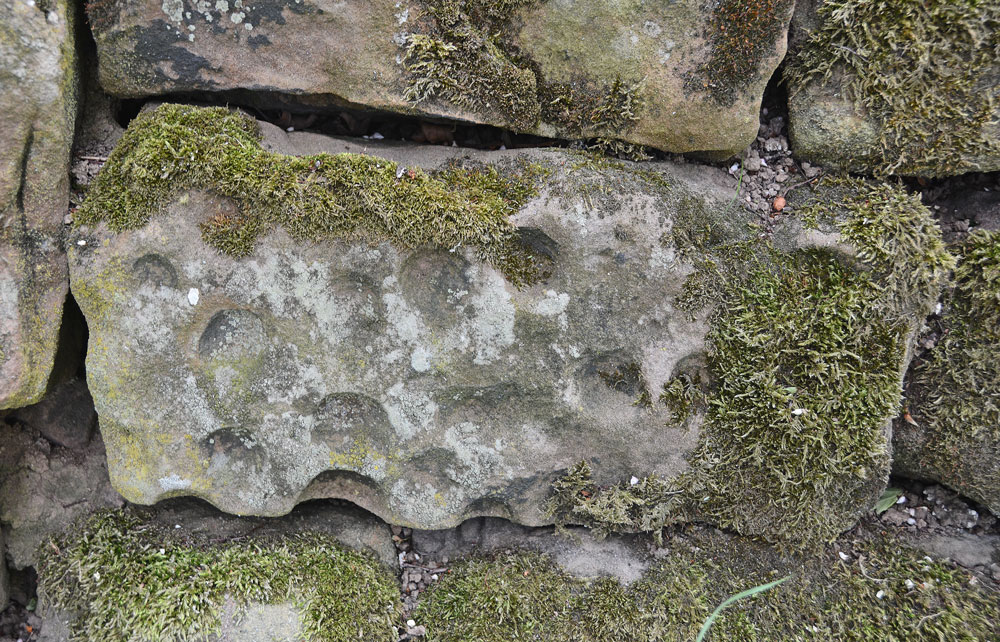
Alnmouth Wall Rock 32 submitted by Anne T on 12th Jun 2019. Close up of Alnmouth Wall Rock Panel 32.
(View photo, vote or add a comment)
Log Text: Alnmouth Wall Rock Panels, Alnmouth: A short walk up a lane towards the trig point, with some very friendly horses in the field and some lovely views over the sea and beach. The wall runs for quite a long way, with its eastern side up a slope so it was a little precarious (for those who don't like slopes!) to photograph those panels.
If you visit, there were many, many rabbit holes, so be careful when walking, especially around the trees and the base of the wall.
I have recorded these panels in the order we saw them on the day. Some of the wall was hidden by wooden fencing (a small fenced off area for farm bits and pieces) and brambles/barbed wire, Many panels at the base and top of the wall are covered by turf, so we only managed to see 11 out of 39.
I have three panels I'm trying to match up my photos with those recorded on ERA (138.7, 8 and 11). Despite having reasonably accurate grid references, it's been a bit of a challenge to match up the and will add these when I can.
Alnmouth Wall Rock 26
Trip No.138 Entry No.10 Date Added: 13th Jun 2019
Site Type: Rock Art
Country: England (Northumberland)
Visited: Yes on 3rd Jun 2019. My rating: Condition 3 Ambience 3 Access 4
Alnmouth Wall Rock 26 submitted by SolarMegalith on 20th Jan 2013. Close-up on the cup-marks on Alnmouth Wall Rock 26 (photo taken on January 2013).
(View photo, vote or add a comment)
Log Text: Alnmouth Wall Rock 26: for main visit report see Alnmouth Wall Rock 32.
Alnmouth Wall Rock 24
Trip No.138 Entry No.9 Date Added: 13th Jun 2019
Site Type: Rock Art
Country: England (Northumberland)
Visited: Yes on 3rd Jun 2019. My rating: Condition 3 Ambience 3 Access 4
Alnmouth Wall Rock 24 submitted by SolarMegalith on 20th Jan 2013. Close-up on the cup-marks (photo taken on January 2013).
(View photo, vote or add a comment)
Log Text: Alnmouth Wall Rock 24: for main visit report see Alnmouth Wall Rock 32.
Alnmouth Wall Rock 16
Trip No.138 Entry No.6 Date Added: 13th Jun 2019
Site Type: Rock Art
Country: England (Northumberland)
Visited: Yes on 3rd Jun 2019. My rating: Condition 3 Ambience 3 Access 4
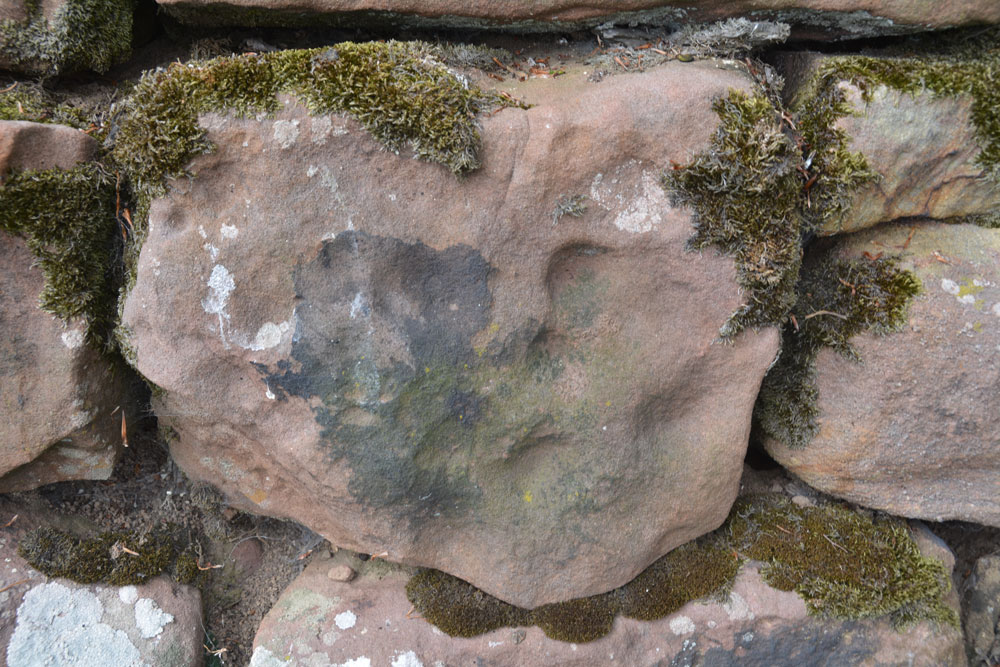
Alnmouth Wall Rock 16 submitted by Anne T on 13th Jun 2019. Alnmouth Wall Panel 16, which Beckensall has a minimum of 16 cups.
(View photo, vote or add a comment)
Log Text: Alnmouth Wall Rock 16: for main visit report see Alnmouth Wall Rock 32
Alnmouth Wall Rock 15
Trip No.138 Entry No.5 Date Added: 13th Jun 2019
Site Type: Rock Art
Country: England (Northumberland)
Visited: Yes on 3rd Jun 2019. My rating: Condition 3 Ambience 3 Access 4
Alnmouth Wall Rock 15 submitted by SolarMegalith on 19th Jan 2013. Close-up on the cup-marks (photo taken on January 2013).
(View photo, vote or add a comment)
Log Text: Alnmouth Wall Rock 15: on top of panel 16. For main visit report see Alnmouth Wall Rock 32.
Alnham
Trip No.12 Entry No.1 Date Added: 7th Mar 2017
Site Type: Ancient Cross
Country: England (Northumberland)
Visited: Yes on 5th Mar 2017. My rating: Condition 3 Ambience 4 Access 5
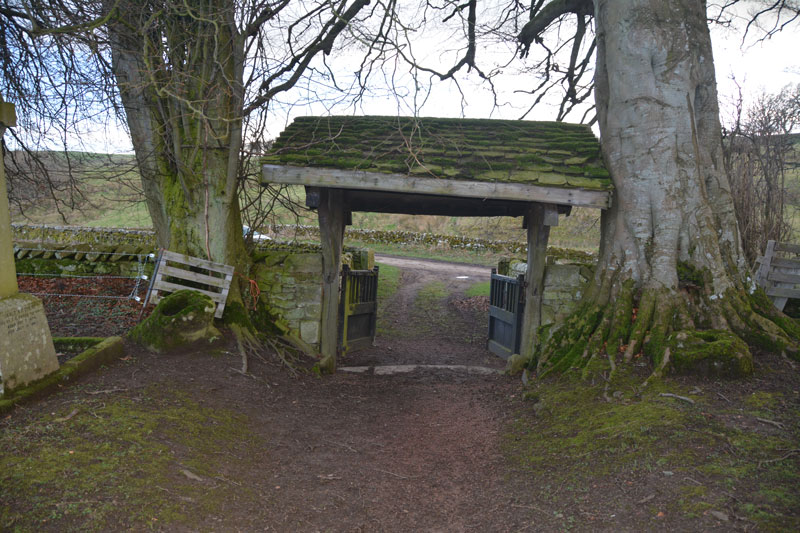
Alnham submitted by Anne T on 7th Mar 2017. Two cross bases lie either side of the lych gate. The church website describes the lych gate as being modern, but it leans/has settled into the trees next to it!
(View photo, vote or add a comment)
Log Text: Alnham, Northumberland. Ancient cross bases: From the A697, we turned left through the pretty little village of Whittingham. The road to the west of the village runs by the meandering course of the (at this point small) River Aln. Just past the village, we turned right onto the minor road leading through Eslington Park and Unthank, the road meandering through minor, muddy single track lanes to Alnham village. Taking the right hand fork (signposted as a dead end road, which it is – eventually), we drove up to the pretty little church.
This is a very remote spot indeed. Opposite the church, you can see the lumps and bumps of the deserted medieval village and the hump of what used to be Alnham Castle. Next to the church is a pele house/tower house, which is lived in. To the far side (from the church) is a footpath which runs up the side of the tower house; this is unusual in that the footpath runs through a small ford.
We had missed the monthly service, which had taken place that morning, but there were signs that other cars had parked on the grass verge outside the church. The lych gate leans into the tall trees either side of it, and the church has a long-deserted air, although candles were still burning on the window ledges inside.
Walking round the churchyard (with its electrified fence to keep any sheep from rubbing against the stone walls) we searched for the cross bases, but found none until we turned to go out of the church, and there they were – one on either side of the lych gate, with a third to the west by the wall.
This church is Grade 1 listed. There were many leaflets about the local countryside and walks, but no church guide. The British Listed Buildings and Wikipedia mention that the church was built on the site of a Roman fortlet, and originally dates from 1135, although because of the ancient cross bases, they think an earlier church existed on this site. Within the porch there is a carved fragment of a rectangular cross shaft, but the carving looks modern.
From the church, we headed further up the hillside to Castlehill Fort and Settlement.
All Saints Church (Weston)
Date Added: 15th Apr 2015
Site Type: Ancient Cross
Country: England (Yorkshire (North))
Visited: Yes on 31st Mar 2015. My rating: Ambience 5 Access 5

All Saints Church (Weston) submitted by Sunny100 on 24th Aug 2010. B/w image of the 9th-10th century Viking cross fragment in All Saints church. The carving depicts a Viking warrior with his sword and a female figure at his side.
(View photo, vote or add a comment)
Log Text: The Weston Cross - repeat visit with key to church! We picked up the key to the church from The Cock Pit Farm Tea Rooms, which is open from 11am until 4pm (summer hours – very popular with cyclists and great tea-cakes and tea). We were very kindly told that if we were back after 4pm (which we were) to drop the key back through their letter box at the rear of the cafe.
We went to find the remains of the Anglo Saxon cross in the north side of the chancel but found this to be a most unusual and interesting church, well worth the visit. Now Grade 1 listed, the present building dates from the 11th century. Locally called “the little church in the fields” it houses a three tier pulpit, the original box pews, a squire’s parlour and a fragment of 14th century glass. There is also an 18th century sundial (minus its brass top).
On the external north wall of the chancellor remains of a scroll can be seen below the window. Behind the mortar, the stone with this carving looks to be contiguous with the one above which seems to have some very weathered patterns on it. Higher up and to the left of this window are two stones which have squares incised into them.
My next mission will be to visit the Yorkshire Museum to see The Weston Man.
The Weston Cross, All Saints Church, Weston, This higgledy-piggledy, pretty little church, almost a patchwork of stonework from different times and styles, is situated in some impressively pretty countryside. Although I understood the church key was readily available from a cottage nearby, no-one was in, so I've had to email for the contact numbers to telephone when we return to the area in a couple of weeks. Parish Administration tell me there's also a key kept at Cock Pit Farm tea rooms on the
main road (opposite the turning to Weston Church), which is open Wednesday to Sunday, 11am to 4pm during summer. There is a small parking area opposite the gates to the stable yard within a few metres of the church gate, which the owner told us was OK to use whilst looking at the church. I'm really looking forward to going back.
All Saints (Rudby-in-Cleveland)
Trip No.56 Entry No.3 Date Added: 16th Oct 2017
Site Type: Early Christian Sculptured Stone
Country: England (Yorkshire (North))
Visited: Yes on 15th Oct 2017. My rating: Condition 3 Ambience 4 Access 5
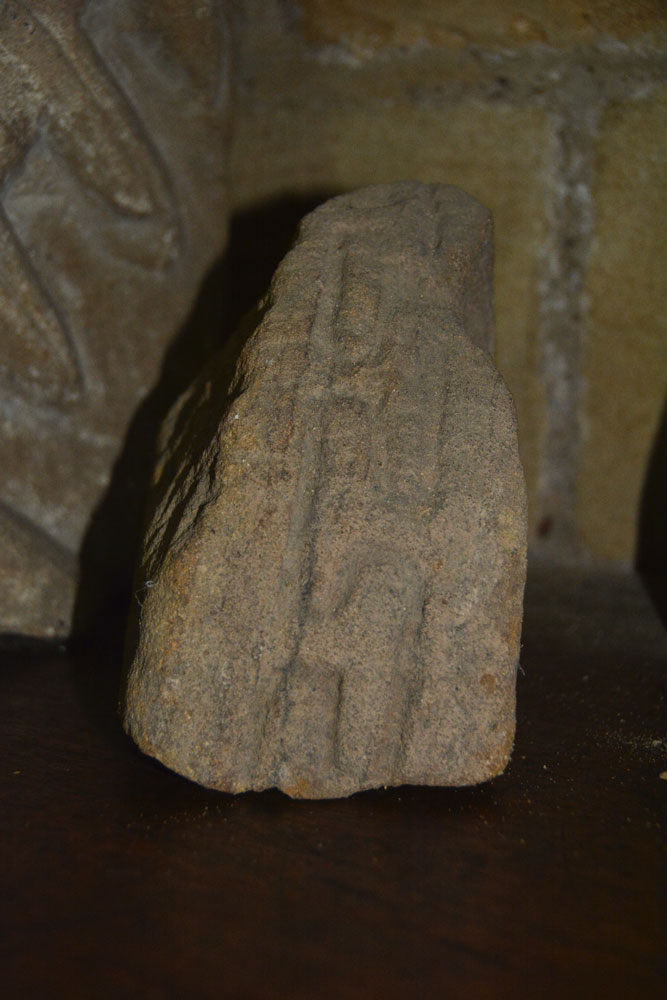
All Saints (Rudby-in-Cleveland) submitted by Anne T on 16th Oct 2017. The outer edge of AS Corpus Rudby 01, which shows a 'grooved meander' pattern. This stone fragment could date from the 11th century, and is possibly earlier.
(View photo, vote or add a comment)
Log Text: All Saints Church, Rudby-in-Cleveland: We’d spent so much time walking round Castle Hill, that by this time of day the sun was very low in the sky and dusk was going to fall pretty quickly, pretty soon.
Parking opposite the church at NZ 47133 06667, just off Rudby Bank in a small paved area which apparently used to be used for the main benefactor’s horse and carriage, we walked into the churchyard.
Much to our surprise, the church was open, so we let ourselves in. Parts of this building are really old. There is also an Elizabethan pulpit and a memorial slab to a 14th century monk holding a chalice.
We also found some old pieces of stone, not mentioned in the church guide, but one portion of which was on the AS Corpus.
Whilst I explored the church, Andrew went in search of the moat, and found it running round the northern part of the churchyard. It is very weird – just a large ditch, most of which is largely dry.
The eastern (modern) part of the graveyard contains the grave of Sir Rex Hunt, Governor of the Falkland Islands when Argentina invaded in 1982.
In the west wall of the vestry, this is also a very strange headless statue, which has been inserted into the wall using part of an old tombstone as a shelf.
All Saints (Pickhill)
Trip No.23 Entry No.2 Date Added: 16th May 2017
Site Type: Ancient Cross
Country: England (Yorkshire (North))
Visited: Yes on 11th May 2017. My rating: Condition 3 Ambience 4 Access 5
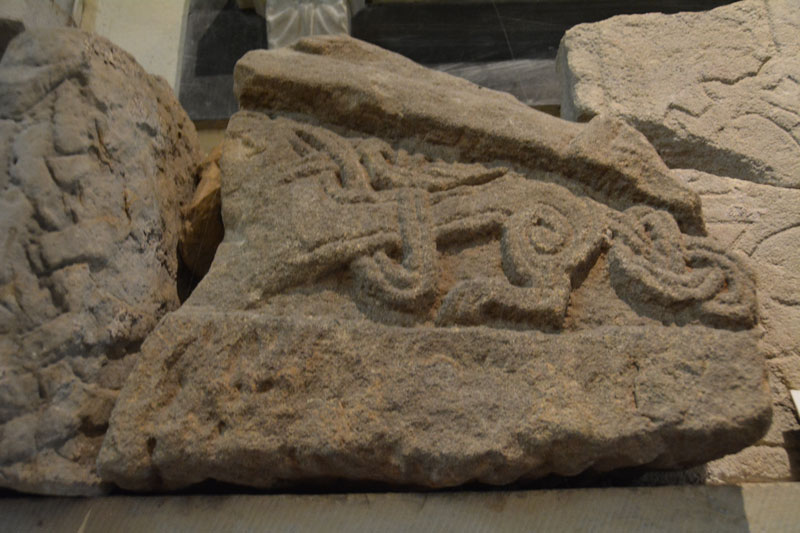
All Saints (Pickhill) submitted by Anne T on 16th May 2017. This piece of hogback shows the remains of a monster with an elaborately knotted tail.
(View photo, vote or add a comment)
Log Text: Hogback and Cross Fragments, Pickhill, North Yorkshire: This church was recommended by ‘Rev Robbo’ (Reverend Ian Robinson) of St. Gregory’s, Bedale, who told us that there was a collection of fragments in the base of the tower. I’d sent an email to the vicar but received no reply, so phoned the number on ‘A Church Near You’ website. The church is open during the day.
The church really is in a lovely location. Going through the lych gate, I was greeted by a mounting block with what looked like an old cross shaft on top, but which was a sundial. On the south wall of the tower there is a very interesting carved beam from the 15th century depicting a hunting scene and a green man.
In the churchyard there are some interesting grave markers. Mentioned in the church guide are 3 markers mentioning the children of the White family, who all died tragically young. The guide also mentions to look out for the mound on which the Norman castle was built.
All Saints (Otley)
Date Added: 2nd Apr 2015
Site Type: Ancient Cross
Country: England (Yorkshire (West))
Visited: Yes on 25th Mar 2015. My rating: Condition 3 Ambience 4 Access 5

All Saints (Otley) submitted by Anne T on 2nd Apr 2015. The collection of Anglo Saxon cross pieces inside All Saints, Otley, next to the Fairfax tomb. There are some good display panels which explain what you are seeing.
(View photo, vote or add a comment)
Log Text: Anglo Saxon Crosses, All Saints, Otley: Having been to Leeds in the morning, we decided to make the rest of the day one of exploration (the first one for a long time!), so made our way back to the north-east via Otley, Weston and Weston Moor. Coming down into Otley from the A660 from Leeds, All Saints is clearly visible in the town centre. We managed to park right outside the church on Burras Lane. Whilst the crosses are well worth seeing, the display of crosses in the church is a little disappointing - on the day we visited they were surrounded by stacked chairs, music stands, speakers and other things, making them seem unimportant.
Right next to the impressive tomb, there are good display boards describing what you are looking at (although no guide book that we could find).
In the churchyard, we found what looked like part of another Anglo Saxon cross shaft in the north-west corner, piled with other architectural pieces. There is an amazing old yew tree with branches touching the ground in places. Nice coffee shops in the vicinity.
All Saints (Northallerton)
Date Added: 4th Aug 2015
Site Type: Ancient Cross
Country: England (Yorkshire (North))
Visited: Yes on 28th Jul 2015. My rating: Condition 3 Ambience 4 Access 5

All Saints (Northallerton) submitted by Anne T on 4th Aug 2015. This wonderful cross head sits on the step at the north western corner of the quire.
(View photo, vote or add a comment)
Log Text: Anglo Danish cross fragments, All Saints Church, Northallerton, North Yorkshire: I found the exterior of All Saints in Northallerton, which sits at the northern end of the High Street on the A167, very forbidding with its blackened stones. However, the inside was nice enough, although very Victorian, and we were made very welcome by a parishioner who had popped in to collect the church magazine. I had to chuckle as the “A Brief Guide to All Saints Parish Church” which says the oldest thing in the church is the Norman grave cover (to be found at the northern eastern corner of the nave). They have ignored the Anglo Saxon (or they correctly call it in this part of the world, Anglo Danish) stones on the window ledges.
The guide book says that there was supposed to be a church of stone built here in the early 7th century by St. Paulinus. “Fragments of stone crosses, possibly of this period, still exist, some built into the walls at various places, while a very fine cross head and separate shaft are on permanent loan to Bede’s World ..... although there is no visual evidence to suggest a significant stone building before the 11th century.” For the picture of the Northallerton Cross at Bede’s world, follow the link http://www.megalithic.co.uk/modules.php?op=modload&name=a312&file=index&do=showpic&pid=133724.
All the crosses, apart from one, which is at the south eastern corner of the choir, sit on window-ledges, most along the north wall and north transept, but some in the small kitchen area at the west end of the north transept. Most remarkable is the fragment with what looks like a sheep.
I’ve had difficulty in finding out more about these stone fragments, although the Corpus of Anglo Saxon Stone Sculpture web site says the North Yorkshire collection will be on-line soon.
Funnily enough, the church guide prides itself on the Robert Mouseman mice on the wooden furniture, and there is a special “Mouse Guide To All Saints Parish Church Northallerton.”
All Saints (Kirby Hill)
Date Added: 4th Aug 2015
Site Type: Ancient Cross
Country: England (Yorkshire (North))
Visited: Yes on 28th Jul 2015. My rating: Condition 3 Ambience 5 Access 5
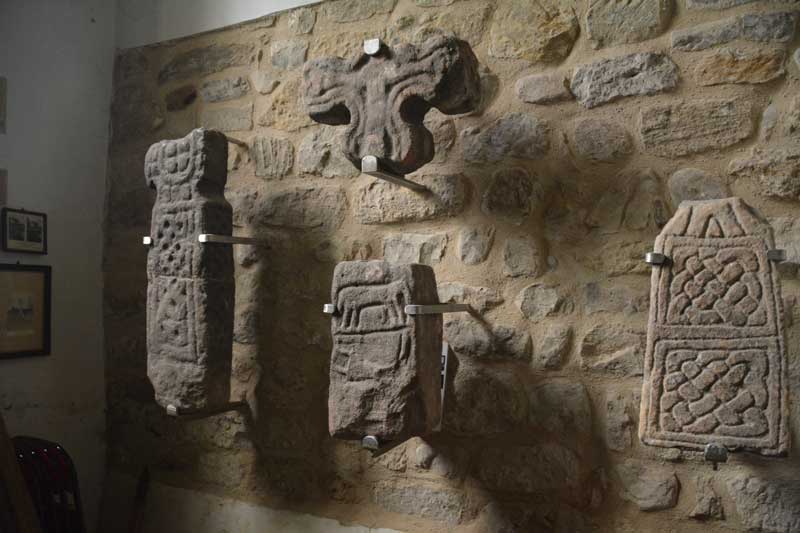
All Saints (Kirby Hill) submitted by Anne T on 4th Aug 2015. These are the Anglo Saxon cross shafts, cross head and an early grave marker displayed on the north wall of the tower.
(View photo, vote or add a comment)
Log Text: Anglo Saxon Crosses, Kirby on the Moor (Kirby Hill), North Yorkshire: All Saints sits on a green just outside the village of Kirby on the Moor, between Church Lane and Millings Lane. There was a notice near the entrance gate saying the church was open on Sundays between 2pm and 4.30pm and ‘all welcome’. However there was a car parked by the church gate and we could hear someone playing the organ. Entering cautiously, I asked if it was OK if we could look around, and the gentleman nodded. He was clearly practicing a piece over and over and I felt we were distracting him somewhat. He had lit the area around the organ, but no lights were on in the church, so it became a bit difficult see the crosses into the interior church walls as I kept having to fire the flash to see. We thanked him and escaped.
The majority of the crosses are displayed in the north wall of the tower, next to the font, so it’s a bit difficult to get great photos as the space is so small. There was a leaflet about the Anglo Saxon stone sculptures that was really helpful.
I’ve just found their web site, All Saints Kirby Hill, which is great. The church is grade 1 listed, the nave being part late Saxon/early Norman, built with large irregular stones including carved slabs and cross shafts of Saxon origin. The web site tells me that the site is one mile north of Boroughbridge, the church is also known as Kirby Hill, and is at the highest point of the village, in line with Aldborough (the Roman civil capital Isurium Brigantum) and other probable sites of the Roman crossings of the River Ure.and is probably on the site of much earlier shrines dating back to Roman or even Celtic times.
All Saints (Ingleby Arncliffe)
Date Added: 29th Apr 2017
Site Type: Ancient Cross
Country: England (Yorkshire (North))
Visited: Yes on 28th Jul 2015. My rating: Condition 3 Ambience 3 Access 5
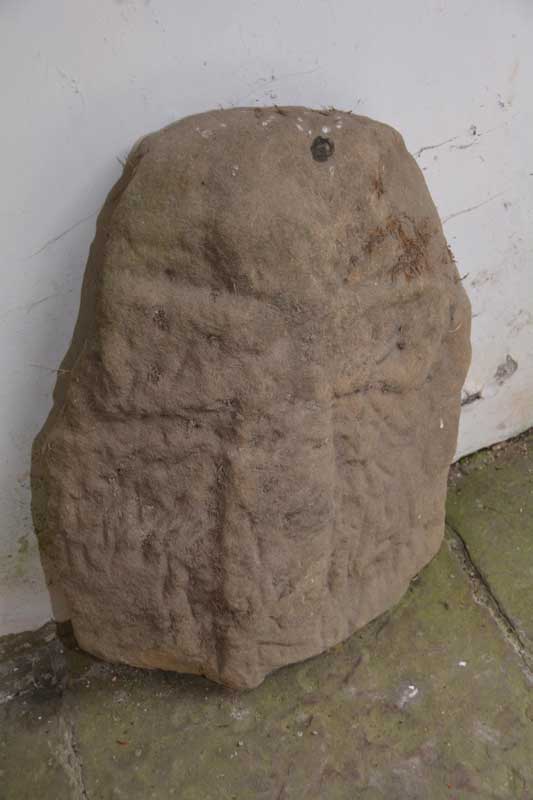
All Saints (Ingleby Arncliffe) submitted by Anne T on 4th Aug 2015. This is the cross which can be found leaning against the north wall of the porch of All Saints, Ingleby Arncliffe. The porch is at the base of the tower.
(View photo, vote or add a comment)
Log Text: Ancient Cross, All Saints Ingleby Arncliffe, North Yorkshire: All Saints at Ingleby Arncliffe is very close to the A19 so we thought we’d stop off on the way back home, but finding this church was quite interesting – we had three unsuccessful attempts, driving down different roads from the centre of the village of Ingleby Cross. In the end, I got the GPS out and found the church straight away. The church is located about a quarter of a mile to the south-east of Ingleby Cross village, having to cross the A172 to reach it. From the cross roads the church is approx. 200 yards to the right hand side with a small parking area by the main gate to the churchyard.
The church many now be really distant from the village, but is right next to the manor house which dominates the view of the churchyard. The church itself was (not surprisingly for the early evening) locked, but we could gain access to the porch which is in the lower part of the tower. There was a cross (very similar to the one at Wath) leaning up against the north wall. We walked right around the building twice but could see no other crosses/old stone fragments built into the fabric of the building. There are supposed to be two more stones built into the tower along with another in the vestry according to the Yorkshire Moors Gazetter. The entry for Ingleby Arncliffe on the British History site says “A hog-back stone found about fifty years ago in a hedge bank and a later coped gravestone are now in the Cathedral Library.”
We peered through the windows of the church, and it appears to be all original box pews with a three-tier pulpit. I have sent an email to the vicar, through the ‘A Church Near You’ web site, asking if it’s possible to pick up a key next week to get inside the church and also see if we can find the stones in the tower.
